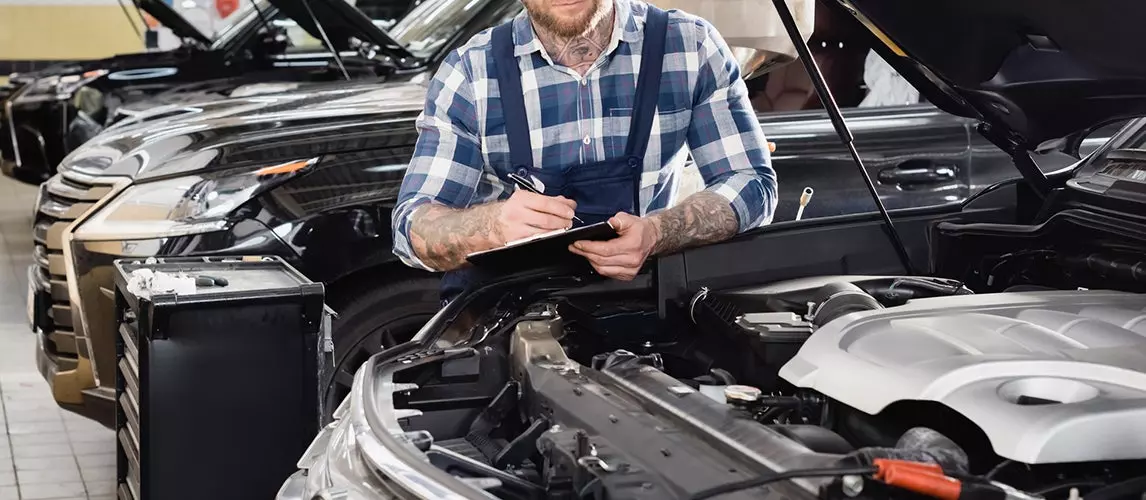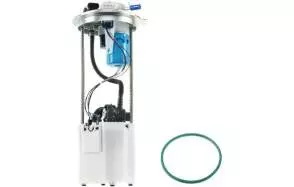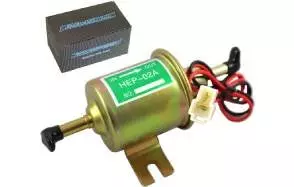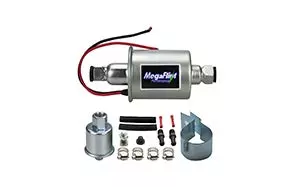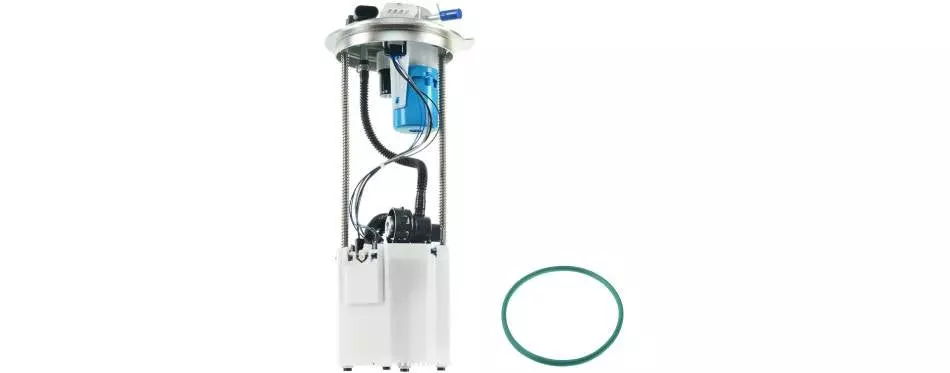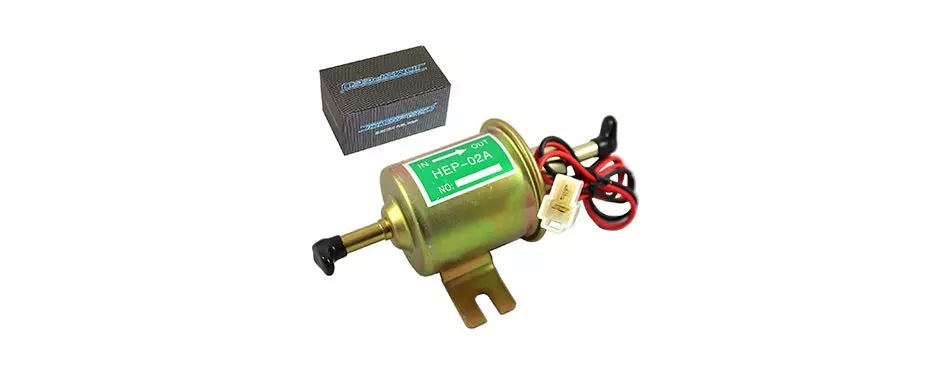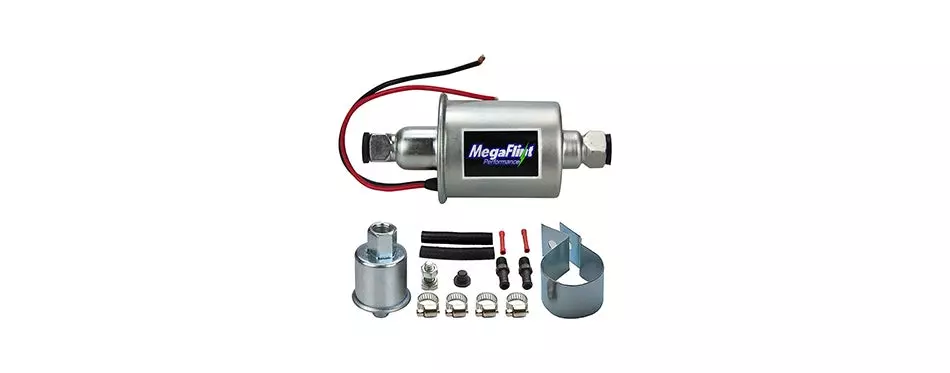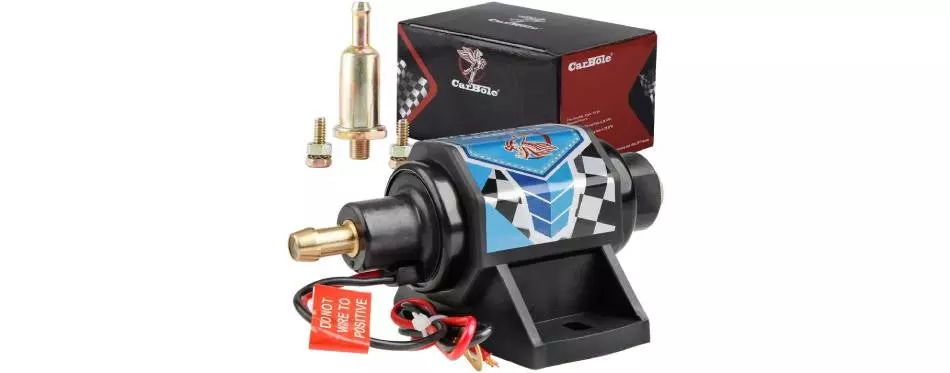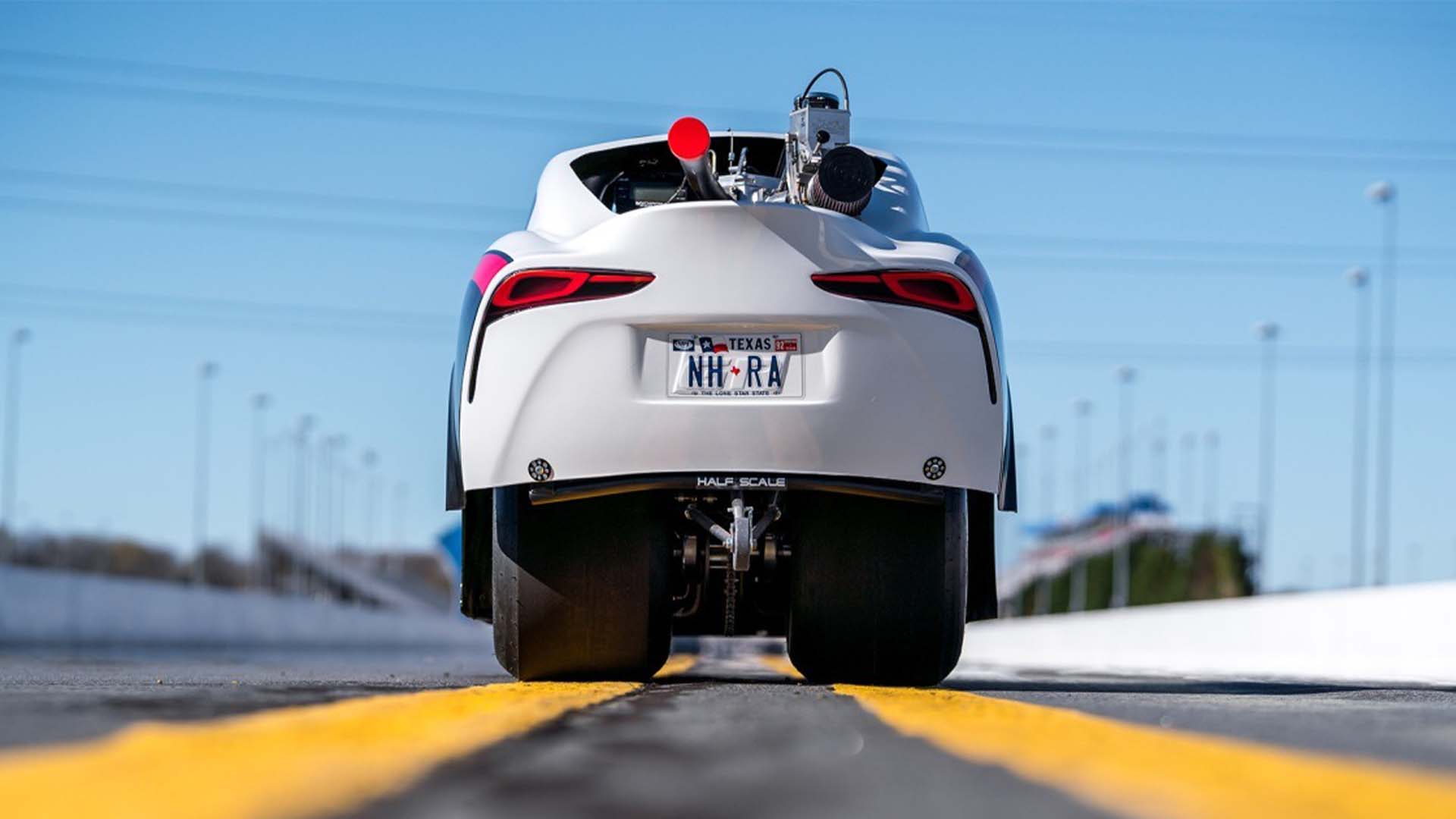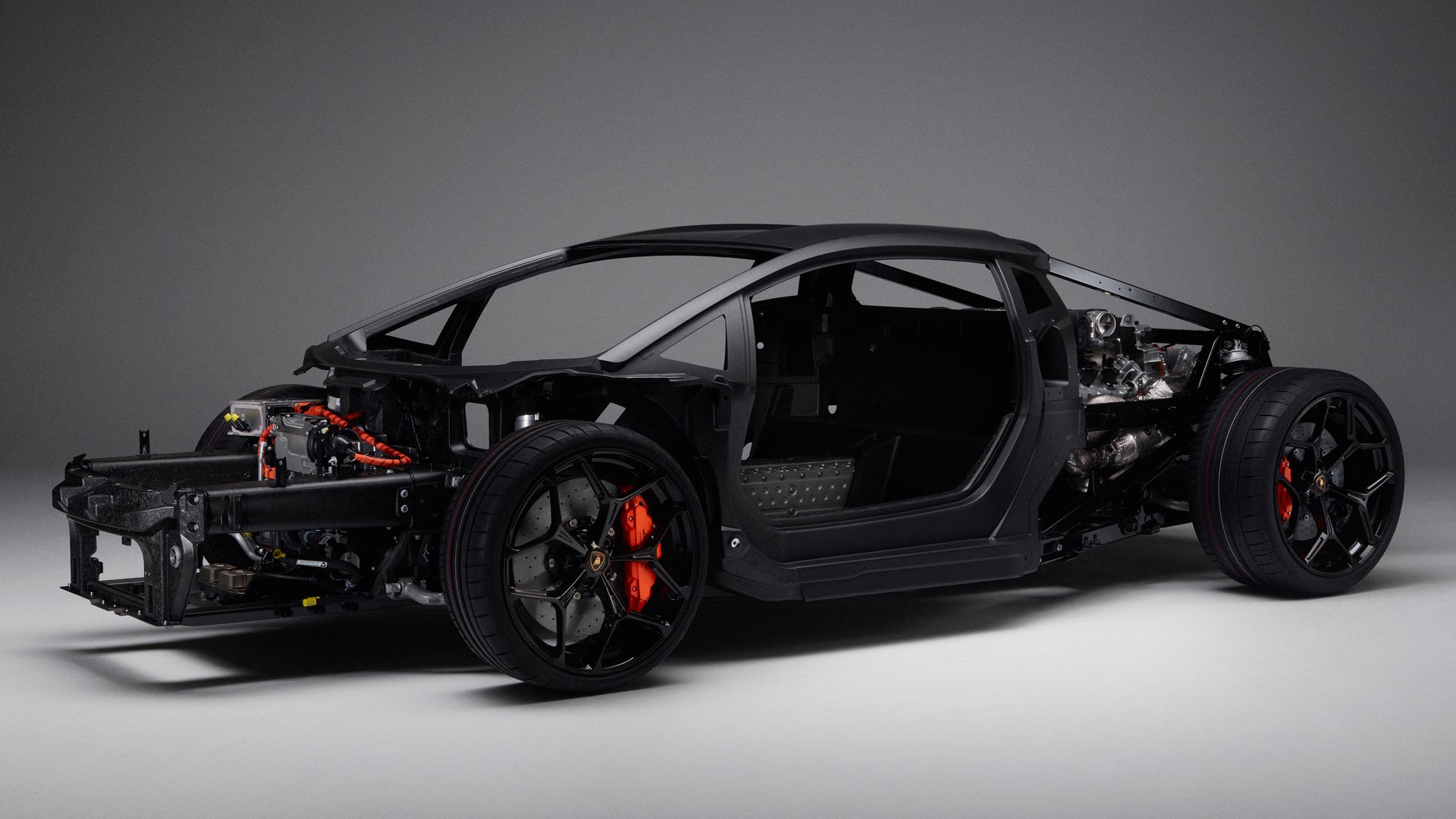An electric fuel pump is one of those necessary parts you need to make your car run. Since the 70’s, most vehicles have relied on electric fuel pumps mounted either inside your fuel tank (or sometimes outside, in certain racing scenarios) in order to feed fuel from the tank to your engine. Whether you’re in the market for a replacement fuel pump or looking to make an upgrade, it’s imperative that you get the proper pump for your specific vehicle. Most electric fuel pumps are not universal, so be sure to double check your vehicle’s requirements prior to purchase. To make the process a little easier, we’ve compiled a list of top electric fuel pumps and an in-depth buying guide to help you know what to look for.
Best Electric Fuel Pump Reviews & Recommendations
The JDMSpeed Universal 12V Electric Fuel Pump might have a budget-friendly price, but it’s also a solid all-around electric fuel pump that offers plenty of value. You’ll get a good bang for your buck from this pump, which is a universal option that works for both gasoline and diesel engines. With a 12-volt and 1.8-amp design, it can deliver output pressure of 3 to 6 PSI. Made out of durable 100 percent brass, it’s designed to survive everything from corrosion to collisions and more. Plus, if you’re looking for a versatile product, this pump will work for cars as well as boats, lawnmowers, and more.
While this electric fuel pump can last you for years (many users say it lasts five years or longer), it is loud while it operates. So if you want something that works quietly, this isn’t the product to pick.
- Brand JDMSpeed
- Model W8AIA39
- Weight 10.6 ounces
Works with both diesel and gasoline engines
Suitable for many 12-volt applications, including cars, boats, generators, and more
100 percent brass construction makes it nicely durable
Loud when running
The Megaflint Inline 12V Universal Electric Fuel Pump is a great product to pick if you’re looking for slightly higher pump pressure and a great warranty. However, the biggest benefit of this electric fuel pump is that it’s 100 percent mechanically tested to ensure optimal performance and durability. This 12-volt pump features a 30 GPH output and an output pressure between 5 and 9 PSI. Made with a built-in German-made copper coil, it’ll work for all 12-volt cars and trucks as well as boats and generators. In addition, it can handle a maximum height of up to 12 inches for fuel suction, and the pump is self-priming. Plus, it’s backed by a two-year factory warranty for added reliability.
There is, however, a small catch. This electric fuel pump is described as having universal compatibility with all cars and trucks, but it doesn’t. Instead, it’s designed to be used with imported vehicles, though it will work with both gasoline and diesel engines. Additionally, be careful during installation since this pump doesn’t come with installation instructions.
- Brand Megaflint
- Model E8012S
- Weight 1.17 pounds
Tested for performance durability before being sold
Built-in German-made copper coil
Self-priming and moderately quiet while running
Backed by a two-year factory warranty
No installation instructions included
Claims to be universal, but is really only meant for imported vehicles
The Carter In-Line Universal Electric Fuel Pump is a product you’ll love if you’re hoping to find a pump that doesn’t make you want to plug your ears. This quiet-running electric fuel pump is as tough and capable as it is quiet, allowing you to tune out the gentle background noise while you’re driving (or working with a running engine). It comes with all the hardware you need for easy installation, plus a step-by-step wiring guide for first-time installers. It’s built with tough turbine technology that delivers quietly flowing fuel with adequate pressure, and it can even lower its strain to meet your engine’s specific requirements. Featuring metal components and silver alloy buttons, the entire pump is constructed for a premium, OE-level fit once installed in your vehicle.
Keep in mind that this electric fuel pump only fits specific vehicle makes and models. It’ll work with certain model years of the Chrysler Crossfire and the Mercedes-Benz C36, C43, Cl55, CL500, CL600, CLK55, and CLK430.
- Brand Carter
- Model P60905
- Weight 3.5 pounds
Designed to be a direct-fit OE fuel pump replacement
Offers multi-layer filtration technology for fresher fuel
Operates at a quieter volume
Includes everything (like hardware and wire harnesses) needed for easy installation
Only works with certain makes and models from particular years
Metal electric fuel pumps can fail when they develop rust and corrosion – but the Carbole Universal 12 Volt Electric Fuel Pump is different. This corrosion-resistant pump is built to survive it all, steering clear of rust and other signs of decay even after many miles and seasons of weather on the road. This 12-volt, 5 to 9 PSI fuel pump features a 35 GPH flow rate and can be mounted within 12 inches of your fuel tank. It’s designed to be universal in its fit, working with most 4, 6, and 8 cylinder carburetor setups. Constructed out of cast iron, it carries a unique corrosion-resistant finish for longer stability and durability. Plus, it can help eliminate vapor lock and flooding.
However, this electric fuel pump isn’t meant for fuel-injected engines, diesel, ethanol, or any non-gasoline setups. It can also be a bit noisy while it’s running.
- Brand Carbole
- Model CB-FUEL-ONE
- Weight 15.8 ounces
Constructed out of cast iron with corrosion-resistant finish
Universal fit for most 4, 6, and 8 cylinder carburetors
Helps eliminate vapor lock and flooding
Works with cars, trucks, boats, lawn mowers, generators, and more
Noisy while running
Only compatible with gasoline engines and can’t be used with fuel injection, diesel, or ethanol setups
How We Selected The Products
To make our product picks for the best electric fuel pumps, we searched solely for 12-volt electric fuel pumps that would work with cars, trucks, and other standard passenger vehicles. However, we also considered 12-volt models that offered universal fits for a wide range of vehicle makes and models for easy fitment and use across different applications. In addition, we took a close look at the material and design, taking users’ remarks into consideration as we assessed durability and performance in real-world settings.
Our product selections, rankings, and awards for this story are based on research. While we haven’t conducted real-world testing on all of these products yet, we’ve looked at consumer testimonials and data, tutorials, and general discussions on social media and in forums. We also consider price and specification in the context of the segment. And, of course, we rely on our institutional knowledge of the automotive landscape to weed out weak products.
Buying Guide/What to Look For
Wondering how to separate the best electric fuel pumps from all the rest? We’ve got everything you need, from tips and tricks to buying advice that’ll make your search a whole lot simpler as you look for a high-quality product.
What to Consider When Buying Electric Fuel Pumps
Types of Electric Fuel Pumps
Inline Electric Fuel Pumps
An inline fuel pump is just about as straightforward as it sounds. It’s an electric pump that’s placed in your vehicle’s fuel lines (or “in line”), sitting between the engine and the fuel tank. This kind of pump is pretty easy to install, and it’s also easy to maintain. It works by pushing fuel from the fuel tank to the engine, and this style of electric fuel pump typically relies on gravity to get that liquid flowing. First, however, you will have to find – or even fabricate – a place to mount an inline pump, one where it won’t have to work very hard to push fuel. This kind of pump tends to work best when it’s as low as possible.
In-Tank Electric Fuel Pumps
An in-tank fuel pump is also pretty straightforward: instead of sitting “in line” with your fuel lines, this style of electric fuel pump sits inside your vehicle’s fuel tank or fuel cell. It’s trickier to install an in-tank fuel pump, and these pumps tend to be more expensive, but they typically work better and more efficiently than inline pumps. With an in-tank fuel pump, you’ll get more consistent performance even when accelerating and fuel levels are low; you also don’t have to worry about gravity. An in-tank pump typically works with a fuel injection system, too, with more power and sleeker configuration when installed.
Electric Fuel Pump Key Features
Mounting Configuration
If you’re going to install an electric fuel pump, you’ve got to determine where it’ll be installed. Some fuel pumps require particular mounting locations or configurations, and others may give you options. Either way, it’s important to know where you can (and can’t) install a given fuel pump. Make sure to check whether the pump you’re considering belongs in your fuel tank or in your fuel line, how it’s installed, and if any particular configuration is required. It’s also a good idea to make sure it’s compatible with your current fuel system too.
Flow Rate
Flow rate might be a small detail that seems insignificant, but it can be pretty significant. The flow rate of any electric fuel pump determines how quickly or slowly the pump supplies fuel to the engine. How much is the right amount will depend on your vehicle, your specific fuel delivery system, and the power output of the pump. For example, carbureted systems will need low-pressure pumps that churn out less fuel at a slower rate. On the other hand, a fuel injection system will need a high rate and a whole lot of fuel.
Fuel Type
Lastly, you can’t forget about fuel type. Electric fuel pumps can be universal – some are specifically made to work with gasoline, diesel, and even ethanol. However, not all pumps are actually universal, and there are quite a few that only work for diesel or only for gasoline. Make sure to check the compatible fuel type for any pump you’re interested in, and make sure it’s tailored to your specific needs.
Electric Fuel Pump Tips and Tricks
As with something you do for decades upon decades, you pick up a few tips and tricks along the way in terms of selecting the right product, and/or using it. That’s the case with us and electric fuel pumps. To help you bridge the information gap, here’s a selection of what we’ve learned along the way.
- If you’re going with an inline electric fuel pump, remember that this kind of pump pushes fuel. It needs gravity’s help to get the job done, so you’ll want to mount it as low as possible – and as close to the fuel tank as possible – to avoid issues.
- Depending on the type of electric fuel pump you choose, you may also need a pressure regulator. Adding one of these accessories can help you maintain consistent and ideal fuel pressure, preventing problems like flooding or running dry.
- Don’t ever let your electric fuel pump run dry (or “starve”). Without fuel, the pump won’t be properly lubricated, and it can overheat and become damaged in no time at all.
FAQs
A: Electric is usually always better, especially if you’re hoping to get plenty of fuel flowing and improved efficiency. And that’s exactly why an electric fuel pump is a preferred choice. With an electric pump, you’ll get efficient, automated functionality. However, there are a few ways a mechanical pump can best an electric one, specifically in reliability and affordability.
A: Yes, most electric fuel pumps are designed to work seamlessly with a carburetor. Just make sure the flow rate is a good match.
A: It depends on the type of fuel pump you choose. If you’re opting for inline, you need it close to the fuel tank and as low as possible to get flowing. If you’re opting for in-tank, you don’t need to worry about the placement as much.
Final Thoughts
Our pick for the best electric fuel pump is the A-Premium Electric Fuel Pump Module Assembly with Pressure Sensor, which is as reliable as it is well-constructed to give you consistency from the second it’s installed. But you also can’t go wrong with the JDMSpeed Universal 12V Electric Fuel Pump, which is a product that offers a combination of affordability and good construction.
